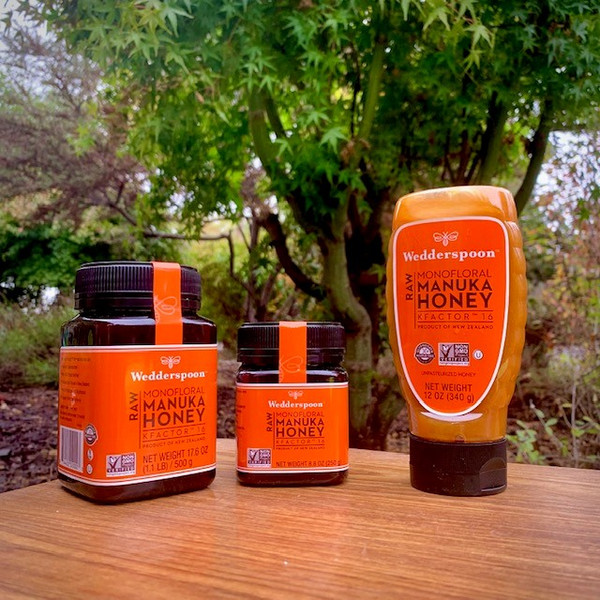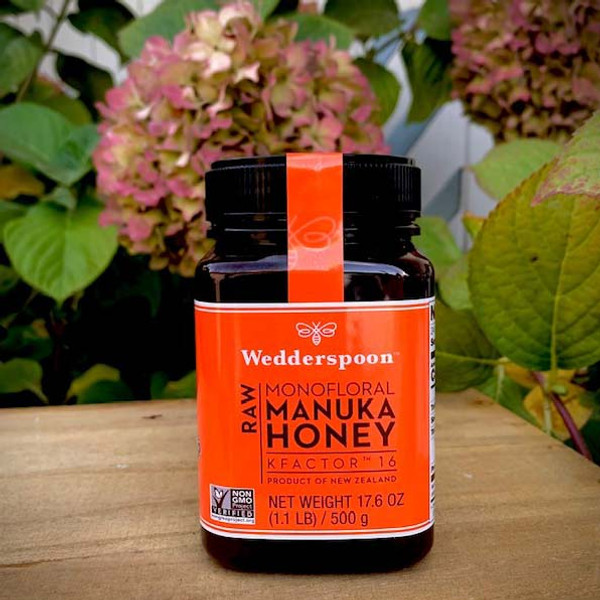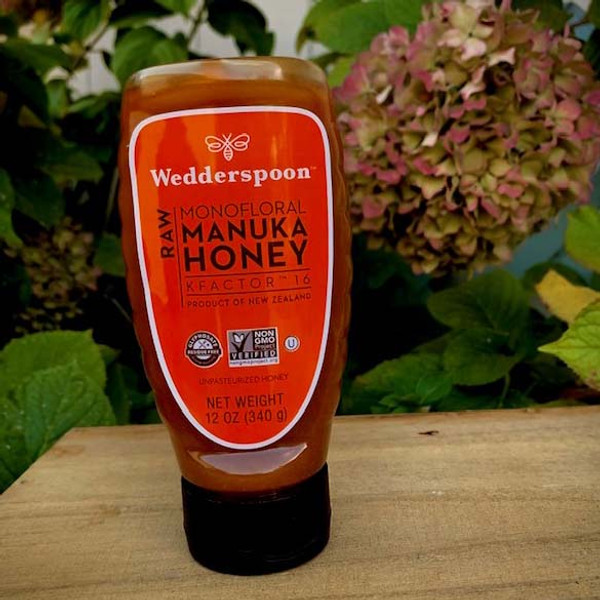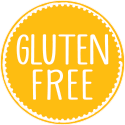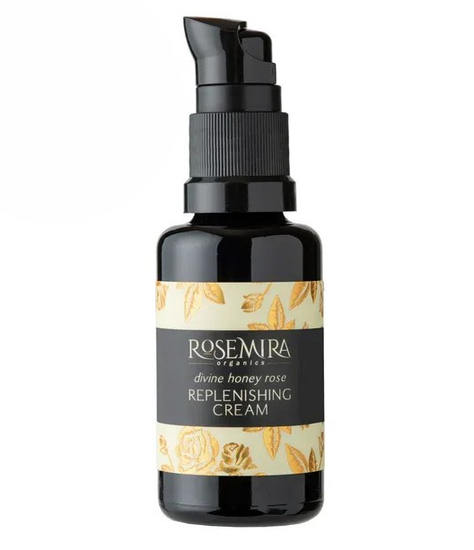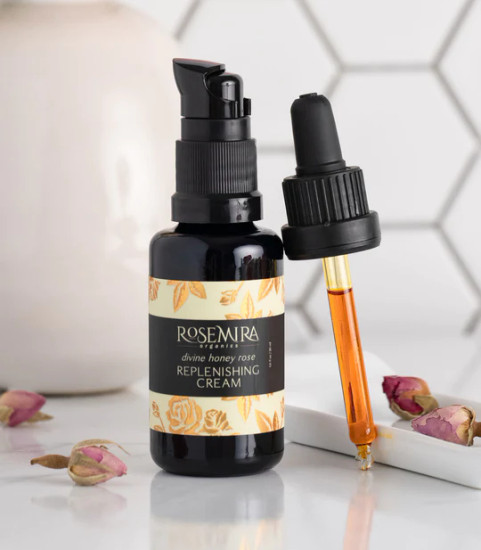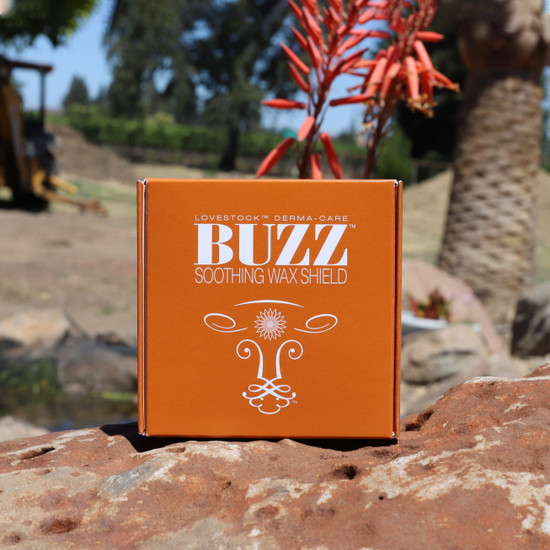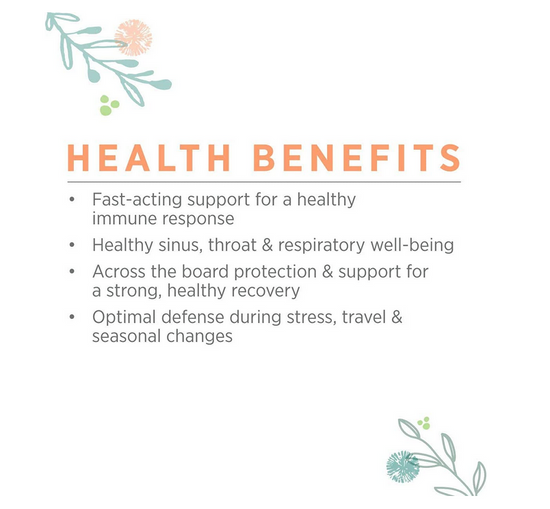Authentic 100% Raw Active Manuka Honey
Wedderspoon's raw manuka honey for sale at Radiant Life is sourced from the remote pristine areas of New Zealand's South Island. As part of their testing methods and to differentiate the potency level, each batch of Wedderspoon Manuka Honey 16+ is sourced and tested for its higher pollen count, live enzymes, antioxidants and various phytochemical components.
Manuka Honey
Nutrition Facts
Jars/Squeeze Bottle
Serving Size: 1 Tbsp (21g)
Servings Per Container: 8.8 oz (250 g) Jar - 12
17.6 oz (500 g) Jar - 24
12 oz (240 g) Jar - 16
| Amount Per Serving | % Daily Value | |
|---|---|---|
| Calories | 70 | |
| Total Fat | 0g | 0% |
| Sodium | 0 mg | 0% |
| Total Carbohydrate | 17 g | 6% |
| Total Sugars | 16 g | 32% |
| Protein | 0g |
Not a significant source of saturated fat, trans fat, cholesterol, dietary fiber, vitamin D, calcium, iron, and potassium
One serving adds 16 g of sugar to your diet and respresents 32% of the Daily Value for Added Sugars
Ingredients: Raw Monofloral Manuka Honey
Unpasteurized Honey
Do not feed to children under 12 months
Store in a cool, dry place
No need to refrigerate
Frequently Asked Questions
Q: What is Manuka Honey?
A: Manuka honey is a highly nutritious, special kind of honey that comes from the Manuka flower nectar gathered by the bees in New Zealand. Manuka is a Maori word that refers to the medicinal flower that grows on both New Zealand's North and South Islands. Manuka Honey is a completely natural, holistic, bio-available and biodegradable product.
Q: Is Manuka honey related to the Tea Tree in Australia?
A: Yes, Manuka Honey originates from the Manuka bush (Tree), which is in the same family as the Melaleuca in Australia, otherwise known as Tea Tree, both of which are world renown for their vast healing properties, Manuka having unique properties, not found in other honeys. Simply research the benefits of Manuka Honey online and on valid Scientific websites that could provide a wealth of information.
Q: Can I find Manuka growing in other countries?
A: Manuka honey is produced in New Zealand from the nectar of Manuka flowers. Manuka is an indigenous Maori word, therefore it is native to New Zealand. Being a part of the Leptospermum scoparium variety, the Australian "Jelly Bush" honey should just be called precisely that, as it typically produces a honey that is very noticeably very different in taste and texture. However, despite these big differences, the Australians can technically somewhat call their jelly bush honey as being Manuka because they are somehow related through the Genus Leptospermum. There are approximately 150 non-medicinal varieties of Leptospermum in existence that are not all related to the Tea Tree, nor do ALL the varieties originate from New Zealand.
Q: How do I take Manuka Honey?
A:Manuka Honey can be taken by the heaping teaspoonful up to 3 times a day depending on your condition. For example, for general digestive maintenance a teaspoon taken daily, at least half an hour before any food is ideal.
Q: How do I store my Wedderspoon Manuka honey once it has been opened?
A: Manuka honey should be stored in a cool dry place.
Q: What is the difference between the active 12+ and active 16+?
A: In Canada or the USA, the meaning of these numbers are used to differentiate the quality between two Manuka honeys and approved as titles for the labels. They are not exactly related to other known trademarks such as products licensed by the Unique Manuka Factor Association since such trademarks are covering medical claims, not supported by the Food and Drug Administration or the Canadian Food Inspection Agency and therefore not legally approved for foods and honeys. As part of the lab testings, Wedderspoon separate batches from high grade of Manuka from the lower grade, differentiating the active 12+ from the active 16+. Therefore and while their grading system varies from the norm, Wedderspoon believes to have a more appropriate rating system for its honeys, accounting for important factors, mostly omitted and sometimes on purposes by our competition. Such factors could include live enzymes, pollen count, chemical/residue analysis, antioxidant levels, the raw status or unpasteurisation process and various other phytochemical factors found in Manuka honey. It is also important to know that Manuka honey has not uncovered all its benefits and more research needs to be done on the subject. However, Wedderspoon brings you the confidence to provide one of the best quality Manuka line and brand on the market place in North America.
Q: I am monitoring my carbohydrate intake. How can I include the manuka honey in a low carb diet?
A: Honey is a natural product unlike white refined sugar or artificial sweeteners. Scientifically, honey is considered to be "opposite" to conventional sugar. It might then be worth including in your diet, with moderation, for the numerous intrinsic health benefits! One Tablespoon of honey contains 17g of carbohydrates.
Q:I know Organic Manuka Honey is great for adults and children above 1 year of age. Can I give it to an infant aged younger than 12 months?
A: NO! Infants under 12 months of age do not have a fully developed immune system yet, so they should not be given any kind of honey to eat. Infant botulism is a rare, but serious paralytic disease caused by the spores of a bacterial microorganism, Clostridium botulinum. These spores can germinate, grow and produce toxins in the lower bowel of some infants and pasteurization (sterilization) cannot kill such spores. Older children and adults are normally able to ingest the spores without any harm.
1 Review
-
I like Manuka Honey for its medicinal properties.
I had a sore throat, and have always gargled with warm salt water, but it did not help this time, so I made myself hot tea, put a teaspoon of Manuka Honey in it, sipped it, and every hour repeated the process, by evening my sore throat was gone. Like to keep it in my upboard for this and other uses.





